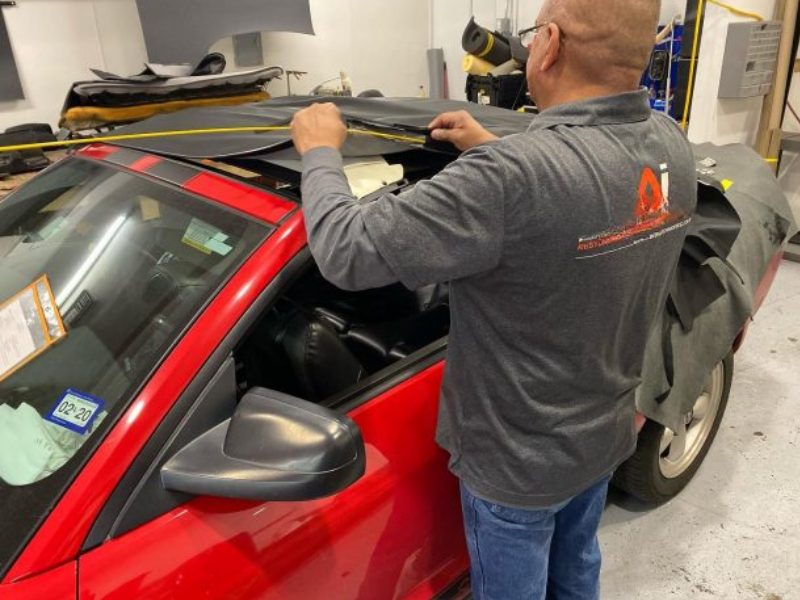Last Updated on October 6, 2023 by Matthew Lloyd
A dirty car air filter can harm your vehicle’s performance, leading to increased fuel consumption, reduced horsepower, and other issues. Cleaning or replacing an old and worn-out air filter is a simple yet essential routine maintenance task for any car owner. When comparing a clean car air filter with a dirty one, the difference in air intake quality is immediately noticeable.
A clean air filter promotes better airflow into the engine and allows more oxygen to reach the spark plugs and cylinders, which helps the engine run smoothly. Additionally, it keeps debris from entering and potentially damaging parts of your engine, like the pistons or fuel injectors. On the other hand, a clogged or dirty car air filter restricts airflow, reduces fuel efficiency significantly, and impairs power output.
Dirty Air Filter Symptoms:

-
Decreasing Gas Mileage

One of the primary signs that you have a dirty air filter is decreasing gas mileage. When your engine isn’t receiving enough clean air, it has to work harder to operate, leading to decreased fuel economy.
-
Engine Misfires

A dirty air filter can cause your engine to misfire. When the air filter is clogged or dirty, it blocks the airflow to the engine. Without enough oxygen, the fuel burns incorrectly and causes an incomplete combustion cycle. This leads to a loss of power and can cause stalling or difficulty starting your vehicle.
-
Strange Engine Noises

A dirty air filter can cause strange engine noises coming from your car. Since the air filter is responsible for trapping dirt and debris before it enters the engine, a clogged or dirty air filter cannot do its job correctly. Any contaminants still in the air can make their way into the engine. As these particles get stuck in different motor components, they may create rattling or knocking sounds as the pieces rub against each other.
-
Check Engine Light Comes On

A dirty car air filter can cause your check engine light to come on since the engine is not getting enough air. The fuel-air mixture is off, and this will cause a misfire, causing your check engine light to come on.
-
Reduction in Horsepower

One symptom of a dirty air filter is reduced horsepower. Your engine must take in sufficient oxygen. Otherwise, it will lack power when accelerating and struggle on inclines. If you sense that your vehicle isn’t as powerful as it once was, it’s likely time to check the condition of your air filter.
-
Flames or Black Smoke from Exhaust Pipe

Flames or black smoke from the exhaust pipe could indicate that too much oxygen enters the combustion chamber due to a dirty air filter, causing fuel to burn inefficiently and excess unburned oil to be pushed into the exhaust system.
-
Strong Fuel Smell

One of the most noticeable dirty air filter symptoms is a strong fuel smell from the engine bay. Over time, particles will build up on the filter, preventing it from adequately filtering out exhaust fumes as they escape through the engine. As these fumes accumulate in the engine bay, drivers notice an unpleasant odor quickly when opening their hoods.
How To Clean A Car Air Filter?

- To clean your car’s air filter, remove it from its housing. Don’t damage the gasket that seals the housing if you reuse the same filter.
- Gently tap out any large dust or debris before using an old toothbrush or soft brush to loosen any remaining dirt particles.
- Then vacuum up all loose particles with an attachment that has good suction power – wear a face mask when doing this!
- If necessary, use compressed air at low pressure to blow away stubborn dirt deep inside the filtering material without damaging it.
- Once all visible dirt has been removed, wash it in warm soapy water before rinsing thoroughly and allowing it to dry completely before reinstalling it into its housing.
If your car is equipped with an oiled-cotton gauze air filter (often found in modern high-performance automobiles), it should be cleaned with special oiling agents designed for this type of filter. If your car has a paper-element air filter (most cars do), warm water and dish soap will do just fine.
What Does A Car Air Filter Do?

A clean air filter is essential for optimal performance. It helps remove dirt, dust, pollen, and other airborne particles from the air that enters your engine’s intake system. This prevents dirt and debris from entering the combustion chamber, where it could damage or wear out internal components like spark plugs or cylinders. Cleaner air also helps ensure efficient combustion with less fuel consumption, leading to better engine performance, fuel economy, and lower emissions.
How Often Should You Clean A Car Air Filter?

Most experts recommend cleaning a car air filter every 12,000 to 15,000 miles or so — or at least once a year — depending on your vehicle type. However, if you live in an area with especially dusty roads or high levels of pollution, then it may be wise to check and clean the filter more often.
Should I Clean Or Replace My Car’s Air Filter?

Whether you clean or replace your car’s air filter depends on its dirty and overall condition. If your car’s engine has been running poorly lately or your fuel economy has been declining steadily, replacing your old air filter with a new one might be necessary.
Conclusion
Replacing your car’s air filter every 12,000 miles or 12 months is an important part of regular vehicle maintenance. A clean air filter ensures the engine receives the correct air to operate efficiently. It also helps reduce emissions and wear on the engine, improves gas mileage, and reduces wear and tear on other components in the vehicle. Not replacing a dirty air filter can damage your engine, reduce fuel economy, create unusual noises, and increase emissions.

